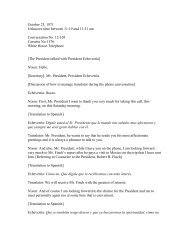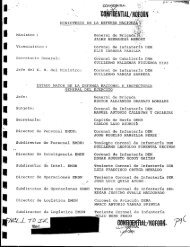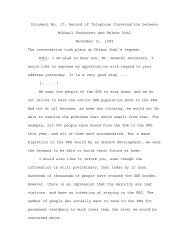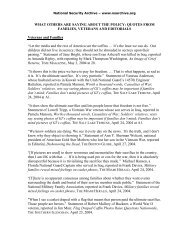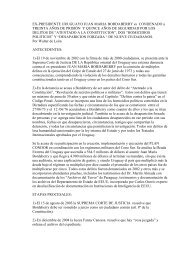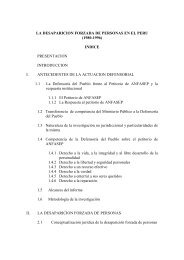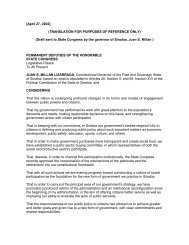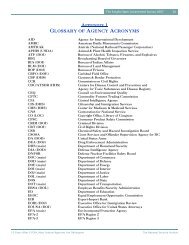TERRORISM 98 - FBI
TERRORISM 98 - FBI
TERRORISM 98 - FBI
You also want an ePaper? Increase the reach of your titles
YUMPU automatically turns print PDFs into web optimized ePapers that Google loves.
to war with the federal government, and the need to<br />
purchase land to establish a new government.<br />
Glover also discussed targeting "law enforcement<br />
towers" in Kansas, detonating explosives at airports<br />
to prevent task force landings, and developing plans<br />
to steal military equipment and weapons from military<br />
armories.<br />
Glover and several associates anticipated an<br />
"engagement" with U.N. troops which they believed<br />
were stationed at Fort Hood. The <strong>FBI</strong> advised the<br />
DoD of the planned assault, and on July 4, 1997, <strong>FBI</strong><br />
Special Agents and officers from the Texas<br />
Department of Public Safety arrested Glover and<br />
co-conspirator Michael Dorsett approximately 40<br />
miles southwest of Fort Hood. Warranted searches of<br />
Glover's truck and Dorsett's home revealed explosive<br />
devices, explosive components, a homemade firearm<br />
silencer, assault rifles, pistols, chemicals, ammunition,<br />
body armor, camouflage clothing, and a copy of<br />
the Militia Soldiers Operations Handbook. Additional<br />
co-conspirators were arrested during the next several<br />
days.<br />
While left-wing and special interest extremists,<br />
such as members of the Plowshares and Los<br />
Macheteros, had perpetrated attacks on DoD facilities<br />
in the United States and Puerto Rico throughout the<br />
1970s and 1<strong>98</strong>0s, this incident marked the first time<br />
that domestic right-wing extremists attempted to<br />
carry out an attack against a U.S. military installation<br />
in the United States. As millennial-oriented<br />
concerns regarding a U.N. takeover of the United<br />
States intensify among some elements of the rightwing<br />
extremist movement, there are indications that<br />
similar targeting may occur.<br />
Protecting Liberties, Safeguarding Bases<br />
The Posse Comitatus Act, Section 1385 of<br />
Title 18, U.S.C. (originally enacted in 1878, during<br />
the Reconstruction Era), prohibits the Army and Air<br />
Force (DoD regulations now restrict the activities of<br />
all branches of the armed services under this Act)<br />
from being used as a "posse comitatus" or otherwise<br />
to execute the laws entrusted to civilian law enforcement<br />
authorities. Judicial authorities have interpreted<br />
the Act to prohibit direct participation by the<br />
military in law enforcement activities. However, the<br />
Act was never intended to prevent the use of military<br />
personnel in a "passive" law enforcement role.<br />
Congress attempted to clarify this intent by enacting<br />
Chapter 18 of Title 10 of the U.S.C., which expressly<br />
authorizes the military to provide civilian law<br />
enforcement agencies with intelligence, facilities,<br />
training, equipment, and, under certain conditions,<br />
assistance in operating and maintaining that equipment.<br />
For example, Section 382 of Title 10 permits<br />
the military to provide equipment, facilities and<br />
personnel in support of Department of Justice activities<br />
relating to the enforcement of laws during an<br />
emergency situation involving biological and<br />
chemical weapons of mass destruction. Section 375<br />
of Title 10 requires the Secretary of Defense to prescribe<br />
such regulations as may be necessary to ensure<br />
that any activity (including the provision of equipment<br />
or facility or the assignment or detail of personnel)<br />
under Chapter 18 does not include or permit<br />
direct participation by a member of the Army, Navy,<br />
Air Force, or Marine Corps in a search, seizure,<br />
arrest, or other similar activity unless participation in<br />
such activity by such member is otherwise authorized<br />
by law. Pursuant to this mandate, DoD has published<br />
regulations incorporating the above congressional<br />
intent and providing specific guidance for all<br />
branches of the armed services. As noted in Section<br />
375, under limited circumstances, the military may<br />
be authorized by law to engage in direct participation<br />
with law enforcement. For example, Section 831 of<br />
Title 18 permits DoD to assist the Department of<br />
Justice in enforcing Section 831 (prohibits transactions<br />
involving nuclear materials). This assistance<br />
may include the use of DoD personnel to arrest<br />
persons and conduct searches and seizures with<br />
<strong>TERRORISM</strong> IN THE UNITED STATES 19<strong>98</strong><br />
20




